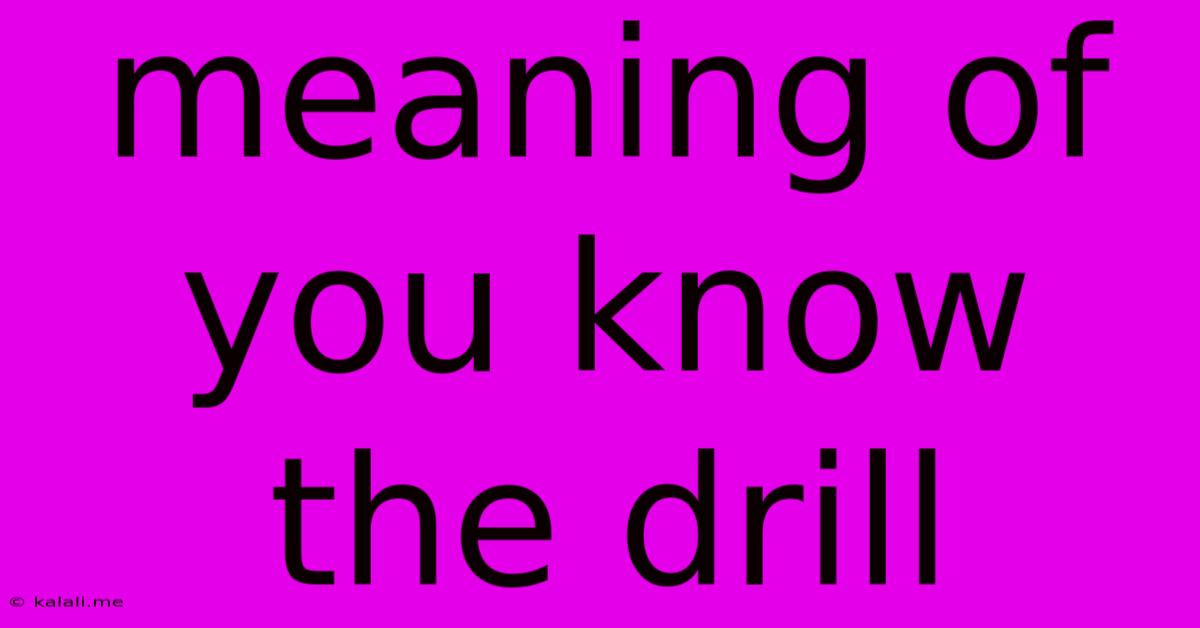Meaning Of You Know The Drill
Kalali
Jun 06, 2025 · 3 min read

Table of Contents
Decoding "You Know the Drill": Understanding This Common Phrase
"You know the drill." It's a phrase tossed around casually in conversations, emails, and even work environments. But what does it really mean? This seemingly simple phrase carries a nuanced meaning, depending on context, and understanding its various interpretations is key to effective communication. This article will explore the meaning, usage, and subtle variations of "you know the drill," helping you navigate its meaning in different situations.
What exactly does this commonly used phrase mean? It's essentially a shorthand way of saying, "You're familiar with the procedure, steps, or routine; therefore, I don't need to explain it again." It implies prior knowledge and shared understanding. Think of it as a shortcut to a longer explanation, relying on the listener's familiarity with the situation.
Variations and Nuances of "You Know the Drill"
The phrase's meaning can subtly shift depending on the tone and context:
-
In a positive, efficient context: It can convey a sense of camaraderie and shared understanding, implying smooth workflow and efficiency. For example, a project manager might say "You know the drill: submit your reports by Friday." This is a friendly reminder, not an instruction.
-
In a slightly negative or impatient tone: It can sound dismissive or even condescending, particularly if the listener doesn't know the drill. The speaker's impatience might be evident, suggesting frustration with having to repeat instructions. For instance, a parent might say "Clean your room, you know the drill," with a tone implying previous, unsuccessful attempts at explanation.
-
As a playful or sarcastic remark: The phrase can be used ironically, when the procedure is unconventional or particularly difficult. For example, a colleague might say "Let's try that new software. You know the drill: expect a few crashes."
Synonyms and Alternatives
There are several alternatives to "you know the drill," each carrying slightly different connotations:
- "Same as usual": This is a suitable replacement when referring to established routines.
- "Follow the procedure": This is a more formal and directive alternative.
- "Do what you always do": This implies a consistent pattern of behavior.
- "As per usual": Similar to "same as usual," implying regularity and established patterns.
- "Business as usual": Specifically used when the situation remains unchanged, even in potentially disruptive circumstances.
The Importance of Context
The key to understanding "you know the drill" lies in considering the context:
- The speaker's tone: Is it friendly, impatient, or sarcastic?
- The relationship between the speaker and listener: Are they close colleagues, family members, or strangers?
- The specific situation: Is it a routine task or a complex procedure?
By paying close attention to these factors, you can accurately interpret the intended meaning.
Conclusion
"You know the drill" is a versatile, frequently used phrase that relies heavily on shared understanding and context. While seemingly simple, its meaning can range from a helpful reminder to a subtle expression of impatience. Understanding the nuances of its usage is crucial for effective communication and avoiding potential misunderstandings. By recognizing the variations and considering the surrounding context, you can better comprehend and utilize this common idiom in your everyday interactions.
Latest Posts
Latest Posts
-
How Long Can You Leave A Crossbow Cocked
Jun 07, 2025
-
Down Sleeping Bag Smells Like Wet Dog
Jun 07, 2025
-
How To Move A Chest In Stardew Valley
Jun 07, 2025
-
Is Oxiclean Laundry Sanitizer The Same Thing As Oxiclean Bleach
Jun 07, 2025
-
How To Spell Lights Name From Death Note In Japanese
Jun 07, 2025
Related Post
Thank you for visiting our website which covers about Meaning Of You Know The Drill . We hope the information provided has been useful to you. Feel free to contact us if you have any questions or need further assistance. See you next time and don't miss to bookmark.